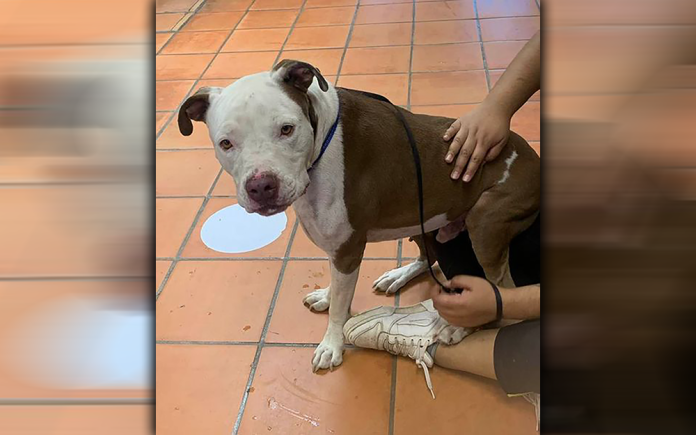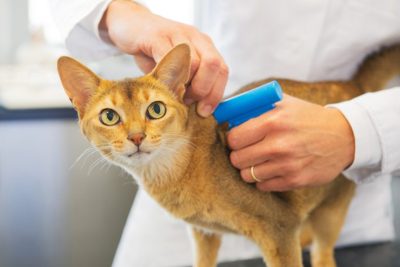
By Janet McAfee
On August 14, an Indio resident brought a stray male pit bull pup to the Loving All Animals’ front gate. She picked him up out of concern for his health and safety running in the blazing heat near her home. We scanned the pup to check for a microchip, not too optimistic one would be located. The dog had the sweetest temperament. He laid down wagging his tail allowing us to move the scanner over his neck and shoulder area and around the sides of his body in case the chip traveled down.
There was a microchip! But the situation was far from resolved. The Avid microchip was tracked to our local Riverside County local shelter, the Coachella Valley Animal Campus, where he was adopted in 2015. However, his adopter failed to register their name, address, and cell phone number with the microchip company. This omission is a common occurrence in the excitement of getting a new pet and busy schedules.
We telephoned the Riverside County Department of Animal Services and provided the microchip number. An officer in the field soon called with the good news “I found the owner in our computer data base and they are on their way now to get Nico!”
The family arrived, but Nico’s story suddenly took another turn. His family loved Nico but gave him to a friend several years earlier when their landlord said his home insurance policy didn’t cover Nico’s breed. They agreed to take him home with them until they could contact the current owner. Two days later Nico had a happy ending in a home where he is loved and well cared for. The current owners updated Avid with their contact information and obtained an engraved ID tag with their cell phone.
What is a microchip? A microchip is a small identification tag that is inserted into the animal’s skin, the size of a grain of rice. It is usually inserted by a veterinarian when the animal is sedated during spaying or neutering. It stings briefly but thereafter the dog or cat suffers no discomfort. There are several microchip companies, and with advances in technology most scanners are universal and able to read every brand of microchip.
Why should you microchip your pet? Knowing your beloved animal is microchipped brings you peace of mind should he ever escape when the gardener leaves your gate open or a visiting friend leaves the front door open too long. His collar may get snagged and come off, leaving the microchip as the only way for animal control and veterinarians to reunite him with his humans.
Animal theft is on the rise. If you know who stole your dog, a microchip provides ownership proof enabling law enforcement to reunite the animal to you. Thieves can remove ID tags and ID trackers but they cannot remove a microchip. Many people don’t know about microchipping and decide to keep a stray animal without conducting due diligence to locate its family.
In 2022, Coachella Valley resident Anna Miller started a nonprofit last year called Scan Lost Animals. Her beloved dog Buddy ran off when a worker left her gate open and even though he was microchipped Buddy was never found. Heartbroken, Anna founded Scan Lost Animals to educate the public about microchipping. The group trained and armed local animal lovers with scanners. Microchip websites can then identify an owner. Some people’s circumstance and schedule make it difficult to travel to a vet or shelter for scanning a found pet. An army of citizens in the field make the process quicker.
 Anna tells us, “Our free scanning service helped or assisted over 100 lost pets in 10 months. Of the 26 scanned pets, 13 were microchipped and returned to their owners within a few hours. As microchipping becomes more important and mandated by new laws, the future looks brighter for lost pets being quickly returned. Nothing is 100% fool proof but adding this layer of protection is the smart thing to do. In May I transferred Scan Lost Animals to Loving All Animals, the perfect place to watch what Buddy started grow.”
Anna tells us, “Our free scanning service helped or assisted over 100 lost pets in 10 months. Of the 26 scanned pets, 13 were microchipped and returned to their owners within a few hours. As microchipping becomes more important and mandated by new laws, the future looks brighter for lost pets being quickly returned. Nothing is 100% fool proof but adding this layer of protection is the smart thing to do. In May I transferred Scan Lost Animals to Loving All Animals, the perfect place to watch what Buddy started grow.”
Call Loving All Animals at (760)834-7000 if you want to participate in their next microchip insertion clinic. A previous class taught volunteers the skill of microchip insertion by practicing on stuffed toy dogs. Other domestic pets including rabbits, horses, and parrots can also be microchipped. All shelters and veterinary clinics can scan a stray animal at no cost to the finder. Some fire departments have scanners.
A 2022 California law requires shelters and animal control agencies to include adopters’ contact information in the microchip during the transfer. Because of his microchip, Nico is safe today and back in his loving home!












































